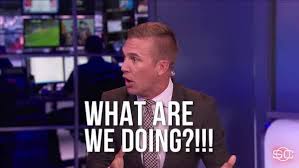The world has changed quite a bit since I started writing this post. In the span of a week - A FUCKING WEEK - we witnessed an assassination attempt on a Presidential candidate, a Vice-Presidential choice, a nominating convention, the other party's candidate existing the race, and the sitting Vice-President picking up the baton and getting off to a sprinting start.
It's safe to say that the dynamics of the 2024 U.S. Presidential race have been upended in ways absolutely unprecedented. But it says here that the stakes have not, which is what I meant to write about in the first place.
 |
This is Kevin Roberts, President of the
Heritage Foundation. He recently told Steve Bannon
"We are in the process of the second
American Revolution, which will remain bloodless
if the left allows it to be.” Charming.
|
In recent weeks, more and more "neutral" political observers have begun to discuss
Project 2025, widely regarded as the Trump campaign's actual (if preferably secret) platform for governance. Written by a number of former Trump officials and acolytes and coordinated by The Heritage Foundation, the 900-page document that details the intentions of the Trump movement is wide-ranging and radical, and serves as a blueprint that guides the things a second Trump administration would seek to implement.
We read* it so you don't have to (and by read, we mean, found some people online who actually did read it, summarized their conclusions, did actually read some text, and then wrote this really quickly). In any government the size of ours, there are offices and programs that deserve scrutiny, and I think any administration that follows the current one is well-served to examine what works and what doesn't. There are things in Project 2025 that are worth considering. For example, the priorities related to the Department of Defense in Chapter 4 (namely, 1) Reestablish a culture of command accountability, non-politicization, and warfighting focus, 2) Transform our armed forces for maximum effectiveness in an era of great-power competition, 3) Provide necessary support to Department of Homeland Security (DHS) border protection operations. Border protection is a national security issue that requires sustained attention and effort by all elements of the executive branch, and 4) Demand financial transparency and accountability) contain some valid critiques of DoD, though #3 makes me a bit nervous. But on balance, there's a lot to be concerned about in the text.
*In a bit of a Gheorghe Notes sorta way
Allow me a bit of an explanatory interlude here. I am prone to the occasional hyperbolic pronouncement. Sometimes that's done for effect, and sometimes I can get a tad carried away. Marls tends to play the sober-minded counterpart to my alarmism, the little c constitutional conservative to my hysterical lefty. And so I tried to do this post with Marls' generally more balanced viewpoint in mind. WWMD, if you will.

Friends, I failed, because this shit is fucked up like a football bat. The policy objectives and prescriptions in Project 2025 amount to nothing short of a wholesale dismantling of a broad range of government programs we take for granted. For one example of many, say goodbye to NOAA, and hello to weather forecasting with Sharpies. From Chapter 21 of the Project 2025 report, "The National Oceanographic and Atmospheric Administration (NOAA) should be dismantled and many of its functions eliminated, sent to other agencies, privatized, or placed under the control of states and territories." The author goes on to say, in regard to NOAA component offices, "Together, these form a colossal operation that has become one of the main drivers of the climate change alarm industry and, as such, is harmful to future U.S. prosperity."
It is worth noting that the commercial concerns that would ostensibly benefit from privatization of certain NOAA functions want no part of it. AccuWeather CEO Steven Smith issued a statement that read in part, " “The American public and economy are best served when all entities provide their expertise, capabilities, and contributions to the common goal of best informing the public and protecting lives and property through accurate and timely forecasts and warnings."
That's a pretty innocuous example, even as it represents the breadth of the project, so maybe let's talk about some of the more grotesque policy recommendations from the worst sort of ghouls (there I go with the hyperbole) like Stephen Miller to Russ Vought.
Let's start with female bodily autonomy, which comes under attack in the Project 2025 report. Sure, abortion is a non-starter with the GOP, but they seem to be coming for contraception, as well. According to analysis by the left-leaning Center for American Progress, more than 48 million American women would be at risk of losing cost-free access to birth control medication. The personal consequences for women would be staggering, to say nothing of the economic implications.
 |
| Lock all these degenerates up. |
The authors of the manifesto call for the criminalization of pornography and the imprisonment of anyone who produces or consumes it. Setting aside the wild impracticality of such a policy, the definition of pornography gives the game away. According to the authors, the "omnipresent propagation of transgender ideology" is a form of pornography, as are texts that influence the "sexualization of children" - the latter term being a preferred dogwhistle of the right referring to LGBT+ predation. All of this is of a piece with the weird sort of Christian nationalism vibe to much of the social policy elements of the document.
In addition to these, the plan seeks to eliminate the Head Start program, defund the FBI, radically shift the tax burden even further from the rich to the middle class, end climate change research (Chapter 2 calls for a "whole of government unwinding" of the Biden Administration's efforts to combat climate change), among a great many other changes large and small.
The icing on this particular cake comes in the broad-reaching changes to Federal employment policy that would ensure a President Trump would be able to replace wide swaths of the bureaucracy with true believers, pushing out anyone deemed sufficiently disloyal to the cause, and increasing the likelihood the policy goals outlined in the document are implemented.
If you're interested in looking more deeply into the sources I leaned on, you can check them out here.
Verify
The Cut.com
People Magazine (when People is doing the work, well, that might tell you something about how their editorial staff views what's happening - or not - in other media outlets.)
There's a reason the Trump campaign is bending over backwards to discredit reporting that connects it with Project 2025: the policies therein are deeply unpopular. If the Harris campaign asks for my advice (and I'm told they're avid readers), I'd tell them to hang this shit around Trump's neck like Christmas lights. I'd also tell them to continue to attack Trump as a felon, a loser, and a shitty businessman. He hates being mocked, and he'll hate it all the more coming from a smart black woman. I think the Dems have traditionally been too unwilling to fight hard, even when they've been punched in the mouth. The stakes now are just too high for them to not go out guns blazing.

























